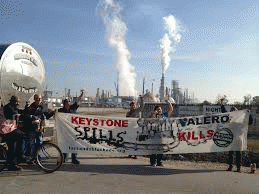Workers! Demand Valero
divest from tar sands. The life you save may just be your own.
I'm a fourth generation
fisherwoman from the Texas Gulf Coast. For 40 years I have made a living on a
shrimp boat plying the Gulf Coast waters. But, for the past 25 years, I
have fought a long and difficult battle with industry to preserve the health and
well-being of our Texas bays and marine life for our children and our children's
children.
Today I am involved in
one of my most difficult challenges. I am on the 35th day of a hunger strike
that I began to convince Valero to divest from Canada's tar sands.
Many stakeholders have
been pulled into this fight that is so colossal and mind boggling that it can
almost be called biblical and not be an exaggeration. The indigenous tribes of
the First Nation in Canada, land owners, cities' water supplies, communities
surrounding the refineries, and the very planet that we call home are all being
threatened by the extraction of tar sands and the XL pipeline that is snaking
its way from Alberta, Canada to the Gulf Coast of Texas.
Workers in the refinery
don't get mentioned much and that's pretty surprising given that workers are
ground zero for exposure from the refining of tar sands.
When a refinery uses a
bitumen blend from Canada's tar sands, it is using a raw material that contains
large quantities of sulfur. This means U.S. refineries using tar sands generally
produce more intense sulfur dioxide air pollution that is, today, not adequately
regulated.
The result is heightened health risks, not only to communities living
near tar sands refineries, but also to the workers inside. In fact, workers are the
most direct line for sulfur dioxide poisoning.
A few statistics from
publicly available sources indicate that, in general, tar sands refineries spew
more sulfur dioxide pollution per barrel produced than refineries that do not
use tar sands. According to
the Environmental Protection Agency (EPA), short-term exposure to elevated
sulfur dioxide levels is associated with reduced lung function, chest tightness,
wheezing, shortness of breath, respiratory illness, deterioration of the
lung's defense systems, and the
aggravation of cardiovascular systems.
In addition, a refinery's
processing of tar sands leaves a toxic cocktail of 20 by-products (often at
1,000 times above the safe limit) that include the cancer-causing chemicals
benzene, toluene, and hydrogen sulfide.
Now I know what some
workers are going to say when they read this. I know because I've asked them
and they say, "Smells like money to me!" or "Not me! I'm healthy!" Or "That's
why I have two life insurance policies." Then stuff
happens.
The experts say 870,000
workers get sick and 55,000-60,000 die each year in the United States from an
occupational disease. Then the experts add the caveat that these numbers are
undoubtedly underestimates. How much of an underestimate? Well, as much as 69
percent of illnesses and injuries never make it to the Bureau of Labor
statistics. And the vast majority of workers with an occupational illness never
receive any benefits from workers compensation.
Ask any injured worker
who's developed an illness brought on by exposure to a chemical and he can
recite a litany of reasons why help never comes.
Work-related illnesses
are difficult to identify, especially those with long periods between exposure
and illness. Part of the problem is simply an absence of data on the health
effects of hazardous exposures. Absolutely nothing is known about potential
toxicity for more than 85 percent of chemicals in use in industry. In addition,
routine training on known hazards and their effects is lacking. The average
doctor receives four hours or less of training in occupational medicine in a four-year
medical school curriculum.
But the major reason is
Occupational Safety and Health Administration's (OSHA) reliance on employers
self-reporting. Employers have strong incentives for under-reporting illnesses
or not at all. Businesses with few illnesses on the job are least likely to
receive inspections from OSHA, they have lower worker compensation insurance
premiums, and they have a better chance of winning government
contracts.
There are other reasons. Employers and Worker Compensation Insurers have major incentives to deny a
connection between a workplace exposure and disease. Every occupational disease
that is not recognized saves them money by socializing the cost on to someone
else, mostly injured workers, their families, and taxpayers.
Workers themselves may
not want to suggest their health problem is work related, fearing they might
lose their job or suffer retribution from an employer angered by a Workers
Compensation claim. Workers report widespread harassment and intimidation when
they report an injury or illness. Reports, testimonies, and new accounts show
that many employers fire or discipline workers who report injuries or illnesses
or complain about a safety problem. Other employers add demerits to a workers
record for reportable illnesses or injuries or absenteeism that resulted from an
alleged safety violation.
Again -- this is all just to say: Workers! Demand Valero divest from tar sands. The life you save may just be
your own.





